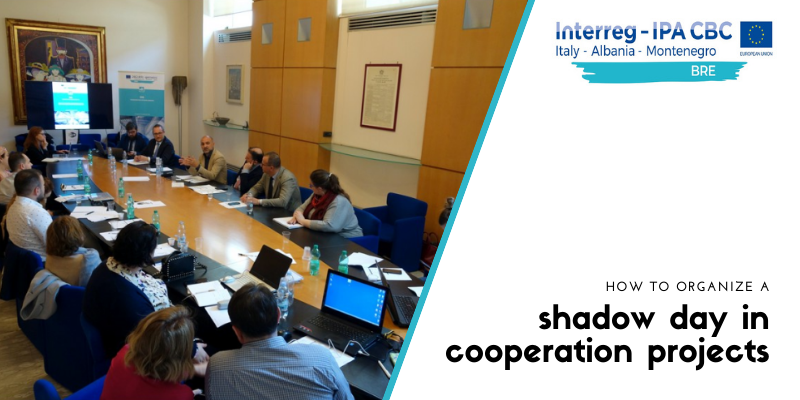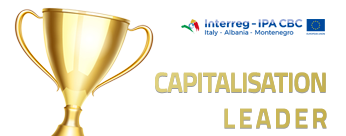
BRE has an important activity centered on training and mentoring for Partners’ employees and managers.
It is a specific action aiming to:
- empower Partners’ internal knowledge on the Business Register best experiences;
- explain the importance and the potentiality of the Platform for the Chambers’ mission;
- spread the knowledge about management of organization among Partners;
- foster business exchanges, matches, partner researches during and after BRE’s end.
To do that, each of the three Countries has organized a “shadow day” for the exchange of experience and know-how at Chamber level. These shadow days will be matching 12 employees on the same level (4 for each Country).
Let’s take a look at the “script” of the interviews made in Italy by Cosmo Albertini, Chamber of Commerce of Bari’s project manager. The following questions were asked to Bari Chamber of Commerce managers. You can inspire yourself for your projects, copy and paste, infer what kind of competencies have been shared thanks to BRE and what kind of impact they might have on each Country’s Business Register’s organization:
INTERVIEW ANGELA PARTIPILO
- Cosmo: Angela, would you explain how the Business Registry came to be in Italy?
Angela outlines the process that led to Law 580, explaining what happened before and what happened after.
- Cosmo: Why does the information collected in our Registry become a guarantee of legality in the relationships between companies?
Angela illustrates the function of visas and certificates for transparency in the relationships between companies.
- Cosmo: In Italy the Chambers of Commerce manage the Registry and also do promotion for companies. In Albania and Montenegro the management of the register is the responsibility of ministerial agencies. How can the Albanian and Montenegrin Chambers of Commerce convince the political decision-makers of the effectiveness of the Italian system of the Business Register?
Angela illustrates the idea of a database built on the Italian model and in which the Albanian and Montenegrin Chambers will upload a group of companies with all the information required by the Italian system. Then she explains why it is necessary to involve political decision makers and explain them “why” the Italian system works, not only “how”.
INTERVIEW ANTONIO BRUNO
- Cosmo: Let's imagine that in a B2B some Albanian buyers want to meet companies from Puglia that produce footwear. How can we be sure that we will be able to extract a list of companies producing exactly that from the companies register?
Antonio: The procedure of assigning an activity code that the company can exercise is very important. It has to be rigorous, because it allows to classify a company and recognize it tomorrow. In the European Union there is only one statistical system, called NACE. The one we use in Italy is ATECO, which is the Italian translation of NACE. Therefore, in any Italian business register, the filing of activities takes place according to a precise classification, established at European level. The classification is precise and the same for everyone. The ATECO code is a combination of letters and numbers that is attributed to companies at the moment of their opening; it serves to classify them according to the type of activity that they will carry out.
- Cosmo: Can you give us an example of the various levels of which the ATECO activity code is composed?
Antonio: Imagine we are talking about people with a bachelor's degree; but then you need to narrow it down to people with a medical degree; then you specifically want it to be a heart surgeon; then again, a heart surgeon who is skilled in remote operations via computer. The ATECO is exactly like that. It has a 6-level structure, and you can go down as much detail as you want about the activity. Take a company that does manufacturing; Go into more detail and it says it manufactures leather goods; Go into more detail and it can choose between bag and leather goods manufacturing or shoe manufacturing; go down again in detail and can choose to deal with the manufacture of footwear or leather parts for shoes. Our Business Register leaves the company free to tell us what level of detail to go down in the activity code. As long as the level is not the first one. You cannot register as a manufacturing company because it is too generic.
- Cosmo: How does a company's electronic registration system assign the activity code?
Antonio: When starting the registration process, the entrepreneur or his consultant is asked in the Internal Revenue Service forms to enter in a descriptive way the activity he is going to carry out. He can also help himself with an internal search engine. The real strength is that this search engine only returns activities provided for by the ATECO classification. The company chooses, and the system automatically assigns a code that it finds in the ATECO classification. If the company carries out more than one activity, for example shoe production and retail sales, it is possible to attribute the main code and other codes for secondary activities. Through this function the system will insert in the above-mentioned forms, also the corresponding ATECO Code.
INTERVIEW NINNI MASTROPAOLO
- Cosmo: When the Italian entrepreneur or his consultant has to register a company, it has to exist for various entities: Chambers of Commerce, Internal Revenue Service, INPS. Does the entrepreneur have to make the rounds of several Agencies?
Ninni: No. The procedure is entirely telematic and takes place through a single channel: the website www.impresainungiorno.gov.it. Through this platform, you communicate simultaneously with various players: with the Internal Revenue Service (which attributes the VAT number and assigns an ATECO code); with the Chamber of Commerce of the area of competence (which starts the registration of the company in the Register of Companies); with other public bodies: Inps (national social security institute), lnail (national insurance institute against accidents at work) and Suap (Municipality).
All these public administrations are aware of the start of the economic activity. Everything is centralized. The entrepreneur, after having informatically prepared the forms, through the portal "Impresa in un giorno" (Enterprise in one day), will proceed to the sending of a UNIQUE COMMUNICATION, a real folder of collection of all the documents prepared informatically. This sending will allow, automatically and simultaneously, that all the involved administrations receive the forms of their own competence.
This is followed by an automated investigation phase, at the end of which the entrepreneur obtains a unique response with which he will be communicated a series of data, the VAT number, the ATECO code, as well as the registration details of the Register of Companies, Inps and Inail. In practice he has opened a position with all the various Public Administrations involved and they all know that he is active and that he carries out that specific activity.
- Cosmo: Can we see how the registration of a company with an Italian Chamber of Commerce works?
Ninni illustrates screen shot of Scriba/Starweb
- Cosmo: Ninni, you are in charge of the section of the business register dedicated to artisan companies. What characterizes the artisan enterprise for the Italian law?
Ninni illustrates in a very simple way the regulatory framework of the artisan company.
INTERVIEW LUIGI TRIGGIANI
- Cosmo: Luigi, our database offers a lot of useful information for various purposes. Marketing, statistics, business internationalization. Can you give us some examples of the application of that information?
Luigi illustrates what can be done starting with the business registry: B2B (segmentation and matching of supply and demand) and Statistical-economic analysis (we can not only give numbers of companies, but also aggregate balance sheets and thus treat the economy as if it were a mega-company with studiable balance sheet data).
- Cosmo: Unioncamere Puglia, implementing agency of the BRE project, has had an office in Tirana for 20 years. What does the office deal with?
Luigi answers about Tirana office (services offered, anecdotes, real episodes).
- Cosmo: In which sectors can Italy, Albania and Montenegro work better together? What are the most interesting opportunities for collaboration between the three countries today?
Luigi responds with a scenario analysis and concrete examples of possible collaboration between the countries (concrete sectors on one side and on the other).

